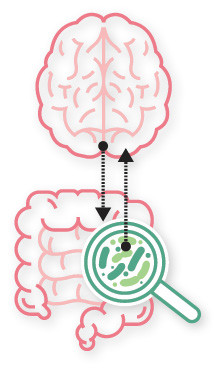Do our microbes affect our behavior?
From the doctor
 We've known for almost 200 years that trillions of microbes live on our skin and deep inside us, particularly in our gut. Until recently, we thought they were just freeloaders using our bodies to get food and shelter, causing us no trouble. However, we now know that the genes of these microbes (our microbiome) make many chemicals that affect our body and may influence our vulnerability to heart disease, diabetes, obesity, depression, anxiety, and several degenerative neurological diseases.
We've known for almost 200 years that trillions of microbes live on our skin and deep inside us, particularly in our gut. Until recently, we thought they were just freeloaders using our bodies to get food and shelter, causing us no trouble. However, we now know that the genes of these microbes (our microbiome) make many chemicals that affect our body and may influence our vulnerability to heart disease, diabetes, obesity, depression, anxiety, and several degenerative neurological diseases.
Recent studies suggest the microbes within us may also influence our behavior. A study published online Dec. 14, 2022, by the journal Nature compared mice that began exercising when given a running wheel to mice that didn't. There were no differences in their genes. However, there were differences in their gut microbiomes. In the exercisers, there were more bacteria that produced a certain chemical. Whenever these mice ran, that chemical sent signals from the gut up to the brain and ignited the brain's reward centers: they got a "runner's high," and took every opportunity to run. Because of their different microbiome, the "lazy" mice got no such reward and remained couch potatoes. But when the microbiome of the exercisers was placed inside the lazy mice, they began exercising.
If the gut microbiome can influence an animal's motivation to exercise, could that be true in humans? If so, could microbes in our body also affect our motivation to do other things — to use or avoid addictive substances, eat healthier foods, or socialize more readily?
Or consider another microbe within us. When various animals are infected with a parasite called Toxoplasma gondii, they are much more likely to engage in risky behaviors. For example, infected gray wolves in Yellowstone National Park are much more likely than uninfected wolves to strike out on their own or to become dominant in the pack — or to die trying. The same fearlessness is seen in other infected animal species. Infected mice, for example, are less likely to avoid cats.
Roughly 30% of humans are also infected with this same parasite. Could it possibly affect us the way it affects other animals, turning us into fearless risk takers? Studies have found that infected business school students are considerably more likely to aspire to be entrepreneurs (rather than, say, accountants), and that infected professionals attending events for entrepreneurs are much more likely to have already started their own business.
So while the idea is still a long way from being proven, it is possible that the microbes within us not only influence our risk of various diseases but also influence our behavior. Scientists now even consider it conceivable that the microbes within us may influence things like intelligence, attitudes, empathy, who we are attracted to — in short, who we are.
image: © Double Brain/Adobe Stock
About the Author

Anthony L. Komaroff, MD, Editor in Chief, Harvard Health Letter; Editorial Advisory Board Member, Harvard Health Publishing
Disclaimer:
As a service to our readers, Harvard Health Publishing provides access to our library of archived content. Please note the date of last review or update on all articles.
No content on this site, regardless of date, should ever be used as a substitute for direct medical advice from your doctor or other qualified clinician.
















